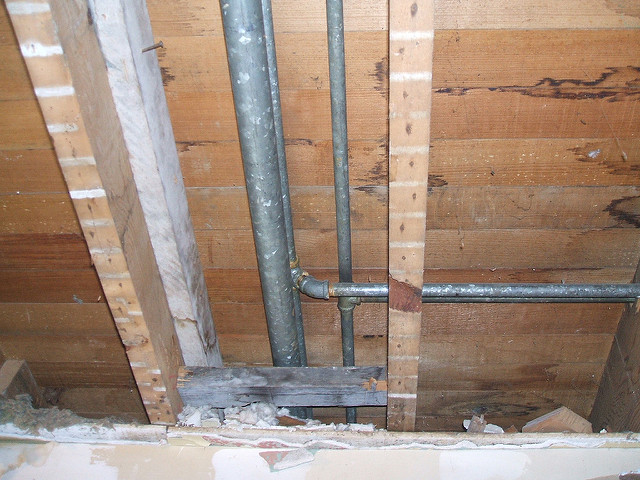Finding Hidden Water Line Leaks: 6 Clever Hacks
Finding Hidden Water Line Leaks: 6 Clever Hacks
Blog Article
Right here down the page you can find a lot of first-rate news relating to Finding hidden leaks.

Early discovery of leaking water lines can alleviate a potential catastrophe. Apart from conserving you money, it will certainly reduce the stress and irritation. The moment you locate a leak, calling your plumber for repair services is the very best option. Some small water leakages might not be visible. Below are some hacks that help if you can not identify it with your naked eyes.
1. Take A Look At the Water Meter
Checking it is a surefire means that helps you find leakages. If it relocates, that suggests a fast-moving leakage. This implies you might have a sluggish leak that can also be below ground.
2. Check Water Intake
Assess your water bills and also track your water intake. As the one paying it, you need to observe if there are any type of disparities. If you find sudden changes, despite your consumption coinciding, it suggests that you have leakages in your plumbing system. Bear in mind, your water expense must fall under the very same array on a monthly basis. An abrupt spike in your costs shows a fast-moving leak.
Meanwhile, a steady increase on a monthly basis, despite the same behaviors, shows you have a slow-moving leakage that's also gradually intensifying. Call a plumber to extensively inspect your home, specifically if you feel a cozy area on your flooring with piping below.
3. Do a Food Coloring Test
When it comes to water intake, 30% comes from toilets. If the color in some way infiltrates your dish during that time without flushing, there's a leakage in between the tank as well as dish.
4. Asses Exterior Lines
Don't fail to remember to examine your exterior water lines too. Should water leak out of the connection, you have a loosened rubber gasket. One small leak can lose bunches of water and spike your water bill.
5. Assess the circumstance as well as check
House owners need to make it a behavior to examine under the sink counters and also inside closets for any kind of bad odor or mold and mildew development. These 2 warnings suggest a leak so timely attention is required. Doing routine evaluations, also bi-annually, can conserve you from a significant issue.
Check for stainings and damaging as many pipelines as well as appliances have a life expectancy. If you presume dripping water lines in your plumbing system, don't wait for it to rise.
Early detection of dripping water lines can reduce a potential catastrophe. Some tiny water leakages might not be visible. Inspecting it is a surefire method that aids you uncover leaks. One little leak can throw away lots of water and surge your water costs.
If you suspect leaking water lines in your plumbing system, don't wait for it to intensify.
How to Know If Your Home Has a Hidden Leak
Water Meter Reveals Inexplicable Water Usage
If you’d like to test whether or not there’s a leak somewhere in your home, you can do this using your water meter. Here is how to conduct the test:
Don’t use any water in your home for at least 30 minutes; this also means not turning on faucets or water-using appliances.
Go outside, and check your water meter for activity.
If your water meter shows that there was activity, even though no one was using any water, this proves that there is a leak in your home.Visible Mold or Mildew Growth
Leaks behind walls create moist, dark environments that allow mold and mildew to grow and thrive. Eventually, you might see mold growth forming on the wall closest to a hidden leak.
If mold is growing in an area that receives a high amount of moisture, such as a bathroom, it may simply be an indication that better ventilation is needed. However, if you see mold growth on a wall or the ceiling in an area where you would not expect, you probably have a hidden leak.
Musty, Mildew Odor
Sometimes you might not be able to see the mold or mildew that is growing as a result of a leak. However, the smell can give the problem away just as easily. If you catch a whiff of something musty, there’s a good chance that old water is collecting somewhere in your home that you can’t see.
Stained/Warped Walls, Ceilings, or Floors
When your home soaks up water, a variety of red flags can become visible, including ceiling stains, bubbling drywall, warped walls, and sagging floors. While these issues can be caused by excess humidity, they can also be signs that a pipe or plumbing connection has started leaking behind your walls.
Inexplicably High Water Bill
After a while, you get a general sense for what your water bill should be. If you own a pool or sprinkler system, your bill will tend to be higher during summer. However, if you receive a water bill that seems especially high, and you can’t figure out what caused it, then you may have a hidden leak somewhere that’s increasing your bill.
https://www.plumbingjoint.com/blog/2019/july/how-to-know-if-your-home-has-a-hidden-leak/

As a devoted reader about Finding hidden leaks, I imagined sharing that topic was sensible. Sharing is caring. Helping people is fun. Thanks so much for going through it.
Best results? Dial! Report this page